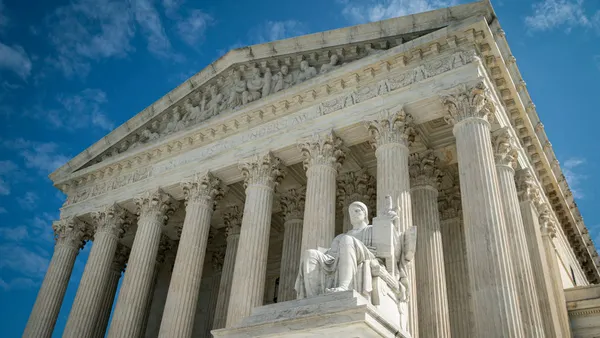Dive Brief:
- PrimeLending, a home loans company, was not able to compel arbitration in a dispute with a former employee, despite the existence of a mandatory arbitration provision, the 8th U.S. Circuit Court of Appeals said (Shockley v. PrimeLending, a PlainsCapital Company, No. 18-1235 (8th Cir. July 15, 2019)).
- The arbitration provision was contained in the employee handbook, which the employee accessed electronically at least twice. The employee did not recall reviewing the handbook, however, and there was no evidence she ever reviewed its full contents, according to court documents.
- A federal district court concluded there was no enforceable agreement to arbitrate under Missouri law. Merely providing a handbook that could be unilaterally changed by the employer did not constitute an offer and, even if it did, the employee's review of the handbook was not an acceptance of that offer, the district court said. On appeal, the 8th Circuit affirmed.
Dive Insight:
The use of mandatory arbitration to settle employment disputes has come under fire lately, particularly when the claims involve harassment, discrimination or assault.
Although mandatory arbitration provisions are fairly common, particularly in the tech industry, allegations of sexual misconduct in the #MeToo era have mounted pressure on employers to discontinue the practice. Google recently did just that in response to public opposition demonstrated by workers and labor organizers. And Google is not alone: Facebook, Microsoft and Uber all recently ended mandatory arbitration for sex harassment claims following public pressure.
The Shockley case does not fall into this category, but it still highlights the problems inherent in binding employees to terms that could potentially be viewed as coercive or one-sided. Earlier this year, lawmakers introduced the Forced Arbitration Injustice Repeal (FAIR) Act, which would invalidate pre-dispute mandatory arbitration agreements. In addition, lawmakers introduced the Restoring Justice for Workers Act to the U.S. House of Representatives this spring. According to Rep. Bobby Scott, D-Va., that act would effectively overturn the U.S. Supreme Court's decision in the Epic case, which upheld employers' rights to require that workers arbitrate disputes on an individual basis and forfeit their rights to collective or class actions.









